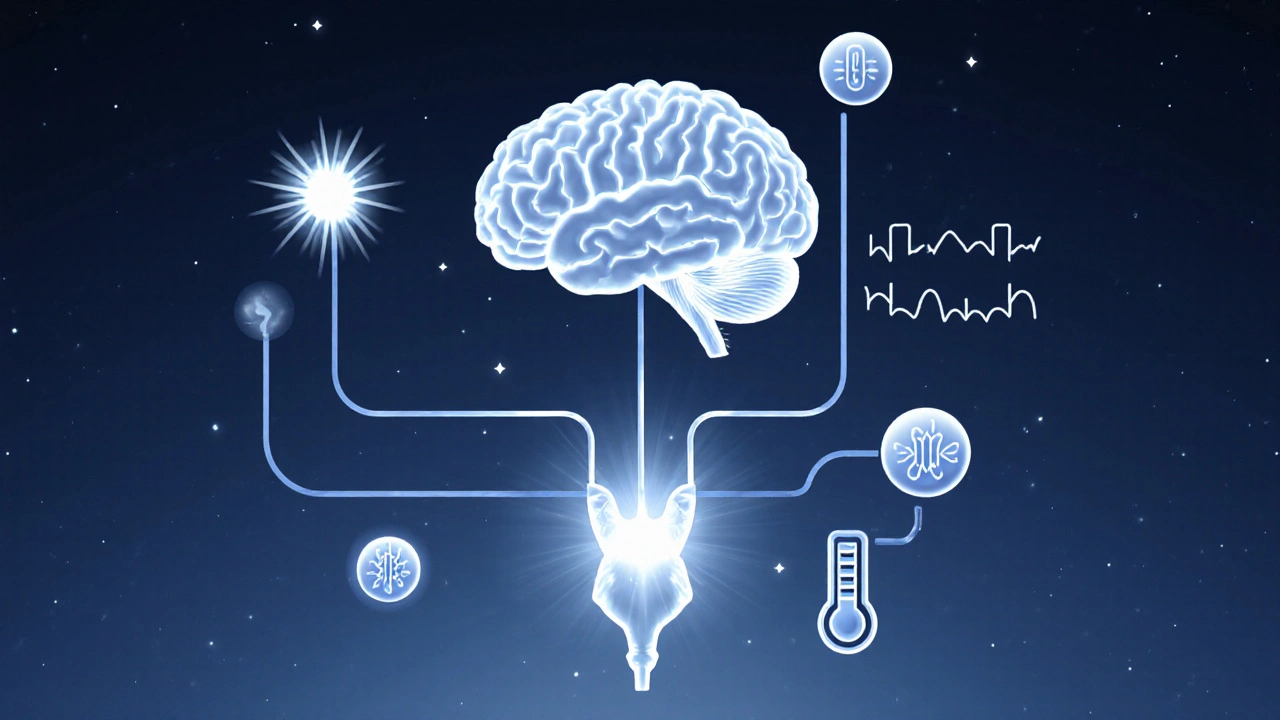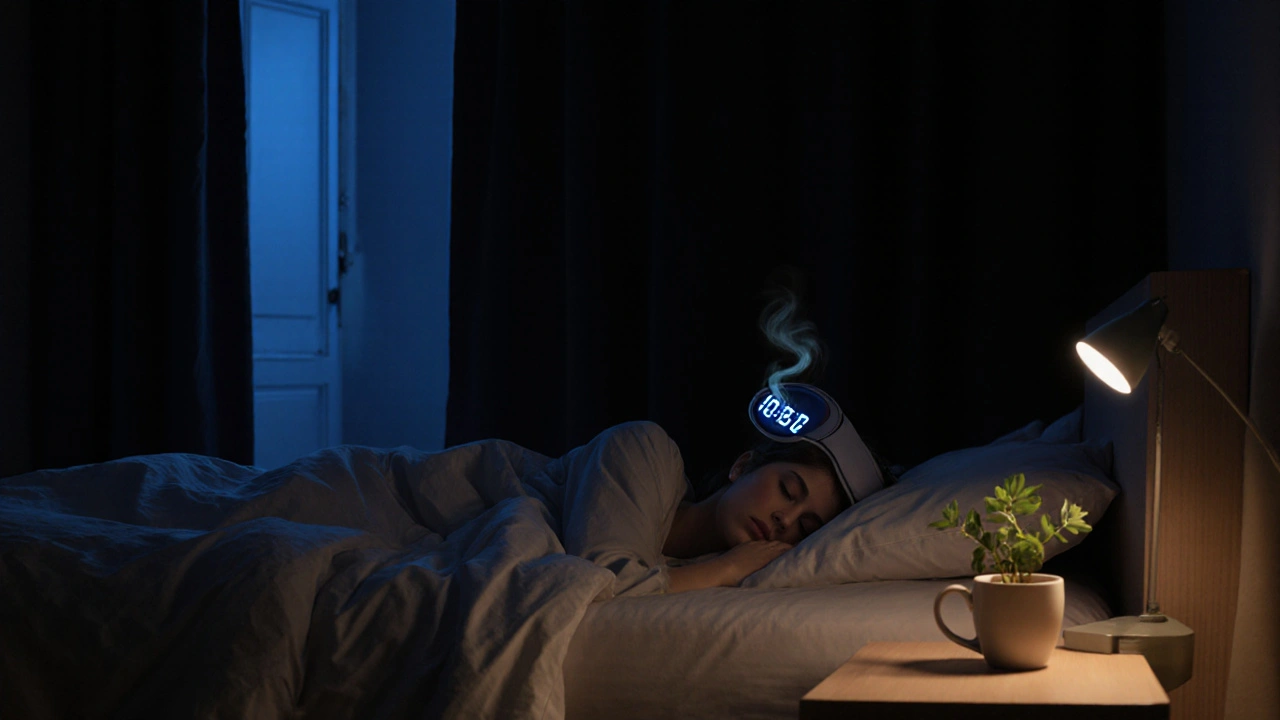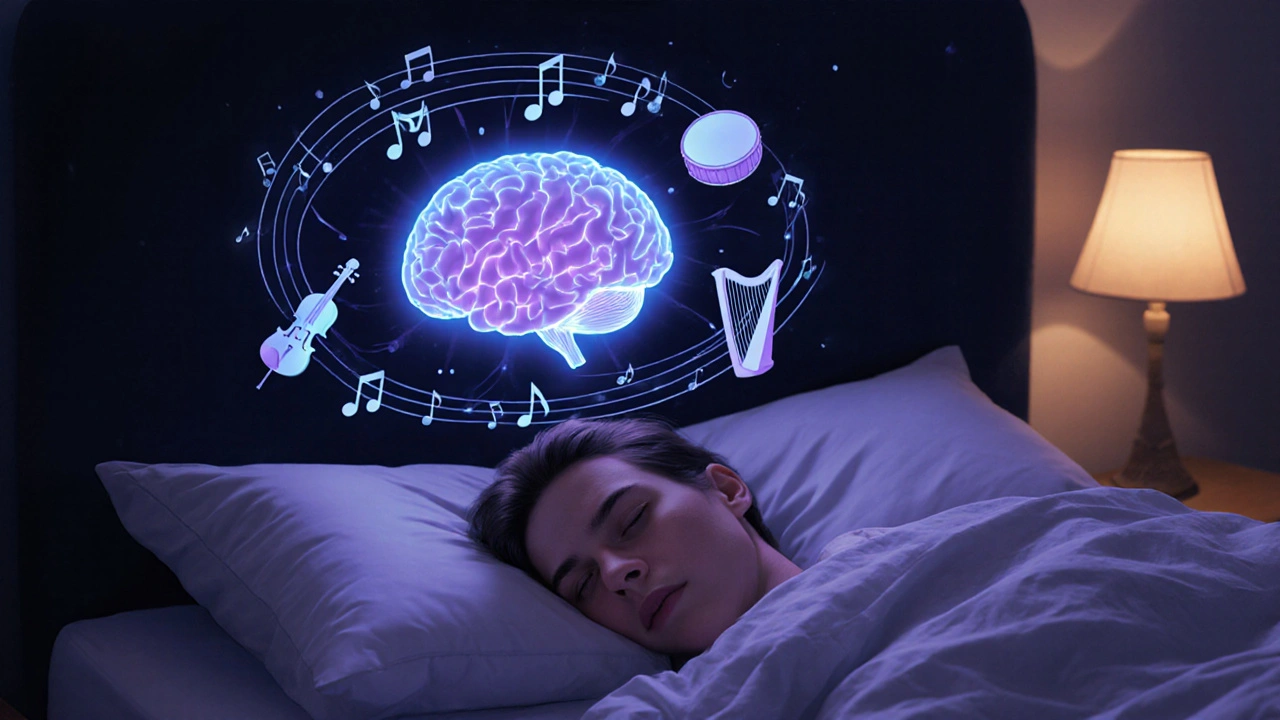REM Sleep Hormone Check
How well is your REM sleep protecting your hormones?
Answer these 6 questions to see if you might be experiencing REM sleep deficiency. Based on research from the Sleep Research Society (2023).
Key Takeaways
- REM sleep is the stage where the brain fine‑tunes the body’s hormone orchestra.
- Melatonin, cortisol, growth hormone, leptin and ghrelin each have a distinct REM signature.
- Missing REM nights can tip the scales toward weight gain, stress overload and slowed recovery.
- Simple habits - consistent bedtime, darkness, and short naps - protect REM and keep hormones in check.
- Watch for early‑morning fatigue, appetite swings or chronic stress as clues that REM‑driven hormone balance is off.
What REM sleep is and why it matters
When you drift into the deepest part of the night, your brain cycles through several stages. The fourth stage, REM sleep, is marked by rapid eye movements, vivid dreaming and a surge of brain activity that looks almost like wakefulness. During this window, the body pauses most muscle movement but keeps the endocrine system humming.
REM typically occupies about 20‑25% of total sleep in a healthy adult. The first REM episode is short - 5‑10 minutes - but each subsequent bout lengthens, reaching 30‑40 minutes toward morning. That pattern is crucial because many hormones hit their peaks in the later REM cycles.

How hormone regulation works during REM
The endocrine system follows a tightly timed script. The hypothalamus sends signals to the pituitary, which then releases downstream hormones. REM acts like a conductor, cueing specific sections of the orchestra at just the right moment.
Two broad mechanisms drive the link:
- Neural activation. REM generates bursts of acetylcholine and suppresses norepinephrine, creating a neurochemical environment that favors hormone secretion.
- Body temperature dip. Core temperature falls about 1‑1.5°C during REM, a cue that triggers the release of certain growth‑related hormones.
Because these mechanisms are rhythm‑locked, any disruption to REM - whether from caffeine, screens or shift work - throws the hormone script off‑beat.
Key hormones and their REM patterns
Below is a snapshot of the most studied hormones and what REM does to them.
| Hormone | Peak Phase | Primary Function | REM Influence |
|---|---|---|---|
| Melatonin | Early night (Stage 1‑2) | Regulates circadian rhythm and sleep onset | REM consolidates the melatonin drop, helping the body transition to daytime alertness. |
| Cortisol | Early morning (hardly detectable in REM) | Stress response, glucose metabolism | Successful REM blocks premature cortisol spikes; fragmented REM leads to early‑morning cortisol spikes. |
| Growth Hormone | Late night (deep N3 and early REM) | Cell repair, muscle growth, metabolism | REM amplifies the GH surge that starts in N3, supporting tissue recovery. |
| Leptin | Throughout REM cycles | Satiety signaling | Consistent REM raises leptin, reducing appetite the next day. |
| Ghrelin | Rises during REM interruptions | Hunger signaling | Fragmented REM spikes ghrelin, often leading to late‑night snacking. |
What happens when REM is short‑changed?
Research from the Sleep Research Society (2023) shows that people who get less than 15% REM over a month experience a 12% rise in fasting insulin and a 9% increase in waist circumference. In plain language, missing REM can nudge you toward insulin resistance and belly fat.
Other real‑world signals include:
- Morning grogginess despite 8‑hour total sleep - a sign cortisol woke up too early.
- Sudden cravings for sugary foods - often ghrelin is out of sync.
- Stalled muscle recovery after workouts - growth hormone didn’t get its full REM boost.
- Mood swings or heightened anxiety - melatonin and cortisol imbalance affect the brain’s stress circuits.
These effects are cumulative. Over months, the hormone drift can translate into chronic conditions such as type 2 diabetes, obesity or persistent fatigue syndrome.

Practical ways to protect your REM and hormone health
Boosting REM doesn’t require a fancy sleep lab; a handful of habits already proven to work can make a big difference.
- Darken the bedroom. Use blackout curtains or a sleep mask. Darkness spikes melatonin early and helps the brain wind down into REM later.
- Keep caffeine after 2PM. Even a small dose can truncate the second REM cycle, reducing growth hormone exposure.
- Limit blue‑light screens 1hour before bed. Blue light suppresses melatonin, pushing the whole REM schedule later.
- Schedule a 90‑minute nap. One full sleep cycle includes REM; a short nap can replenish a missed REM window without harming nighttime sleep.
- Exercise earlier in the day. Physical activity raises growth hormone during early night REM, but vigorous workouts too close to bedtime can elevate cortisol and cut REM.
- Maintain a consistent bedtime. A regular schedule trains the circadian rhythm, which synchronizes hormone release with REM cycles.
Quick REM‑Hormone Checklist
- Sleep 7‑9hours, with at least 90minutes of uninterrupted REM.
- Bedroom darkness ≥90%.
- No caffeine after 14:00.
- Screen‑free hour before lights‑out.
- Exercise before 18:00.
- Wake up at the same time daily.
- Monitor appetite and stress levels; spikes may signal REM loss.
Frequently Asked Questions
How can I tell if I’m missing REM sleep?
Common signs include frequent awakenings, feeling dizzy or hungry in the morning, and a noticeable dip in workout recovery. A sleep tracker that measures eye‑movement patterns can give a direct readout, but even without tech, the symptoms above are reliable clues.
Does alcohol affect REM and hormones?
Yes. Alcohol suppresses REM in the first half of the night, which blunts the growth hormone surge and can cause an early‑morning cortisol spike. The net effect is lower leptin and higher ghrelin, pushing appetite upward.
Is a short nap better than no sleep at all for hormone balance?
A 20‑minute power nap won’t reach REM, but a 90‑minute nap usually includes one REM episode, giving a modest boost to melatonin reset and cortisol control. If you’re short on night sleep, aim for the longer nap.
Can stress itself reduce REM sleep?
Chronic stress elevates cortisol throughout the day, which can fragment REM cycles and shorten their duration. Breaking the stress‑cortisol‑REM loop involves relaxation techniques, consistent sleep timing, and reducing evening stimulants.
What role does the hypothalamus play in REM‑hormone interaction?
The hypothalamus acts as the master clock. It detects the darkness signal, releases corticotropin‑releasing hormone (CRH) during REM, and modulates pituitary output. Disruptions in hypothalamic signaling can lead to mistimed hormone release across the night.


Todd Peeples
October 12, 2025 AT 19:38In the nocturnal odyssey of human physiology, REM sleep functions as the quintessential symphony conductor orchestrating endocrine homeostasis 🌙. The neurochemical milieu during rapid eye movement-characterized by heightened acetylcholine flux and attenuated norepinephrine-facilitates the pulsatile discharge of melatonin, cortisol, growth hormone, leptin, and ghrelin in a temporally precise fashion. Empirical investigations, such as the Sleep Research Society's 2023 cohort analysis, delineate a statistically robust correlation (p < 0.01) between REM proportion and fasting insulin sensitivity. Moreover, the thermoregulatory nadir observed in REM, a decrement of approximately 1.2 °C in core temperature, triggers somatotropic cascades conducive to cellular repair. The circadian clock, anchored by suprachiasmatic nuclei oscillations, synchronizes melatonin synthesis to the early night, yet the consolidation of this hormone's decline transpires during later REM cycles, thereby preparing the organism for diurnal vigilance. Dysregulation of this interplay-via caffeine ingestion post‑afternoon, blue‑light exposure, or irregular sleep timing-precipitates a maladaptive hormonal tableau, manifesting as hypercortisolemia, leptin resistance, and ghrelin surges. From a mechanistic perspective, REM deprivation precipitates a 12 % augmentation in fasting insulin, as documented in longitudinal polysomnographic studies. Clinically, this translates to heightened susceptibility to type‑2 diabetes mellitus and adiposity accrual. Interventions predicated upon augmenting REM-such as implementing blackout curtains, eschewing stimulants after 14:00, and engaging in moderate aerobic activity before 18:00-have been empirically validated to restore hormonal equilibrium. In synthesis, REM sleep epitomizes a neuroendocrine nexus; its preservation is paramount for metabolic vigor and psychophysiological resilience 😊.
Chris Smith
October 12, 2025 AT 21:01Wow another genius tip about darkness and coffee like we’ve never heard that before
Leonard Greenhall
October 12, 2025 AT 22:24While the sentiment is noted, the empirical evidence presented in the article quantifies the impact of caffeine on REM architecture, thereby substantiating the recommendation beyond anecdotal conjecture.
Abigail Brown
October 12, 2025 AT 23:48Imagine waking up feeling truly refreshed, your mind clear, your body humming with the energy of a sunrise-this is the promise of intact REM sleep. When our night‑time narratives unfold in vivid dreams, the endocrine orchestra hits every note on cue, from leptin’s satiety whisper to cortisol’s stress‑shielding roar. It’s not magic; it’s biology, and we have the tools to nurture it. Dark rooms, caffeine curfews, and screen‑free evenings are simple riffs we can play every night. Picture yourself slipping into a blackout‑clad sanctuary, the glow of the day fading away, and your body naturally slipping into that restorative REM tide. Your muscles will thank you, your mood will brighten, and those midnight cravings will lose their grip. The journey begins with one intentional habit, and the ripple effect can transform your whole day. Let’s harness the night and watch the sunrise of our potential together! 🌅
Crystal Slininger
October 13, 2025 AT 01:11Let’s not overlook the covert agenda lurking behind “simple habits.” The sleep‑industry lobby has been funneling caffeine‑free narratives to keep us dependent on their patented melatonin supplements, all while they monitor our biometric data through “wearables.” The data presented about leptin and ghrelin aligns perfectly with the hidden metabolic control mechanisms they’ve been trialing on unsuspecting consumers. If you scrutinize the funding sources of the cited Sleep Research Society study, you’ll find ties to major pharmaceutical conglomerates seeking market share in hormonal therapies. Therefore, while darkness and screen curfews sound benign, they may also serve as a diversion from larger systemic manipulations of our circadian rhythm. Stay vigilant, question the source, and consider that the true remedy might involve a deeper, perhaps even political, restructuring of how we approach sleep hygiene.
Ian Frith
October 13, 2025 AT 02:34Here’s a concise roadmap to safeguard your REM cycles and keep your hormonal landscape balanced: 1️⃣ Darken your bedroom with blackout curtains or a sleep mask to maximize melatonin production. 2️⃣ Avoid caffeine after 2 p.m.; even a small cup can truncate later REM episodes. 3️⃣ Shut down blue‑light emitting devices at least an hour before bedtime; consider amber glasses if you must use screens. 4️⃣ Aim for a consistent sleep‑wake schedule-your internal clock thrives on regularity. 5️⃣ Incorporate a 90‑minute nap if you’re short‑changed at night; that duration typically captures a full REM phase. 6️⃣ Exercise earlier in the day; vigorous workouts close to bedtime can spike cortisol and diminish REM depth. By integrating these evidence‑backed steps, you’ll bolster growth hormone release, stabilize leptin and ghrelin, and reduce cortisol spikes, leading to improved recovery, mood, and metabolic health.
Beauty & Nail Care dublin2
October 13, 2025 AT 03:58i love thsi sooo much 😍 but omg the curtains r pricey lol maybe i just wear a blindfold 😂 also i heard the government put hidden sensors in blackouts they track our dreams 😱
Oliver Harvey
October 13, 2025 AT 05:21Great advice… except the “no screens” rule ignores the fact that many people need night‑shift jobs 😏 ¯\_(ツ)_/¯
Lief Larson
October 13, 2025 AT 06:44People think sleep is boring but it’s actually a powerhouse for hormones you just need darkness caffeine limit and regular schedule
Julia Grace
October 13, 2025 AT 08:08Exactly! Adding a cozy bedtime routine-like reading a good book or sipping herbal tea-can make that whole process feel enjoyable and sustainable 🌼
Sadie Bell
October 13, 2025 AT 09:31You’ve got this! One small change tonight can set the tone for a vibrant, energized tomorrow-let’s make it happen together!
Noah Bentley
October 13, 2025 AT 10:54Sure, “one small change,” because we all have the luxury of perfect sleep environments while the rest of us juggle 9‑to‑5, kids, and endless notifications.
Kathryn Jabek
October 13, 2025 AT 12:18While your optimism is noted, the empirical data unequivocally demonstrates that without stringent adherence to dark environments and caffeine abstinence, REM deficiency persists, rendering any anecdotal enthusiasm frivolous.
ahmad matt
October 13, 2025 AT 13:41Frivolous indeed-especially when the so‑called “data” is cherry‑picked from studies funded by entities with vested interests, turning scientific caution into a marketing ploy for overpriced sleep accessories.